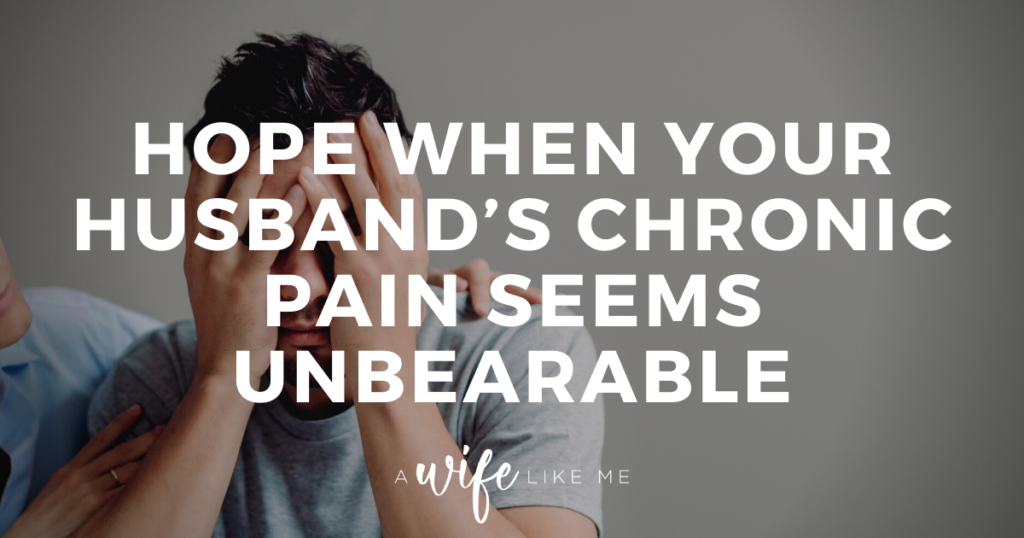Grab our free marriage resources here!
By Dawn R. Ward
Is your husband suffering from chronic pain? Pain seems unbearable for him and you as his wife at times if he has chronic pain.
According to the Center for Disease Control, in 2016 almost 70 million Americans suffered from chronic pain. Approximately 28 percent of the population claimed their pain significantly impacted their daily lives. Whether pain is the result of a debilitating illness or injury, it can have a devastating impact on the health of a marriage when it’s chronic.
When I first met my husband over 40 years ago, one of the things that attracted me to him was his athleticism. Steve loved sports and was always active. Whether it was playing a game of basketball, golfing on the weekends, league bowling, snow skiing in the winter, or hiking and rock climbing in the summer, he was always on the move. I loved physical activity as well, so we had a lot in common.
After we married, we continued to stay active. We had three children, and my husband shared with them his love for sports. He even coached their soccer and basketball teams. This all came to an abrupt halt the day he was involved in a car accident.
At that moment chronic pain entered our lives, our world turned upside down. Nothing prepares you for watching someone you love suffer intensely as they endure multiple surgeries. It is hard to have hope when pain seems unbearable.

Hope for the Hurting
Over the years, I sat helplessly by as my husband’s pain increased and his physical strength and ability declined. While surgery offered some relief, chronic pain continues to limit his mobility and the activities we can participate in as a couple.
When one spouse suffers, the other spouse also suffers. While they may not be in physical pain, their angst is just as real. Looking back over the last 30 years, I realize how much stress has taken a toll on me as his support system.
“The night racks my bones, and the pain that gnaws me takes no rest.” Job 30:17 (ESV)
While his pain has kept us from participating in most physical activities together, it has not kept us from being together. We still enjoy each other’s company tremendously. I have learned to lower my expectations of what we can participate in as a couple. We still travel together and go on date nights, but you won’t find us hiking mountains or water skiing these days. We settle for a leisurely stroll instead.
The good news is that even when the pain seems unbearable, it is possible to remain hopeful for the future of your marriage.
How to Live with Chronic Pain
Here are five ways to remain hopeful when your spouse is suffering from chronic pain.
- Keep praying for your spouse’s healing and relief from pain.
We serve a God of miracles. Medical advances are always being made. Keep seeking wisdom from the Lord, as well as professional help. Whatever you do, don’t give up.
“For nothing is impossible with God.” Luke 1:37 (ESV)
- Seek support for yourself, as well as your spouse.
Don’t do it alone. Pain is very draining for both the one suffering and for their spouse, especially if they are also acting as a caregiver. Talk to your pastor, a counselor or look online for support groups for those living with chronic pain.
“Bear one another’s burdens, and so fulfill the law of Christ.” Galatians 6:2 (ESV)
- Practice self-care
Take care of your physical, emotional and mental health. Living with someone in chronic pain often means the supportive spouse will put their own needs on the back burner. Schedule health check-ups and stick to them. Exercise and eat right. Take regular breaks by getting out of the house for a few hours.
- Develop a soft heart and thick skin.
When someone is in pain, they may do and say things they do not mean and often regret later. While you should never tolerate abuse, try not to take things personally if your spouse is occasionally short-tempered, withdrawn or sullen. (See Ephesians 4:1-3 ESV)
- Find your new normal.
When your spouse is hurting, you hurt right along with him. Learn to find enjoyment in the simple pleasures of life. Whether it’s listening to music, watching your favorite program, or playing a game of cards, it’s about the blessing of being together and enjoying each other’s company. (See 1 Corinthians 13:4-7 ESV)
Living with chronic pain in a marriage is hard, but it is not impossible. The Lord is an ever-present source of strength and comfort. He is your hope when things seem hopeless.
Wife Step: Plan one non-physical activity you can do with your spouse to spend time alone together this week.
Grab our free marriage resources here!

Dawn Ward is a speaker, writer and blogger. She is the founder of The Faith to Flourish, a ministry that equips women who desire to grow in their faith, cultivate healthy relationships and thrive in all seasons of life. She also ministers to women with loved ones struggling with addiction, mental health issues and life-destructive behaviors. Dawn is the co-author of the book “Still Standing After All the Tears Workbook: Faith in the Battle Edition. She has been married to her husband, Steve, for over forty years and is mom to three adult children. It is her passion to help all women grow in their faith as they learn to better understand the Bible and how to apply it to their lives.
Be the first to comment